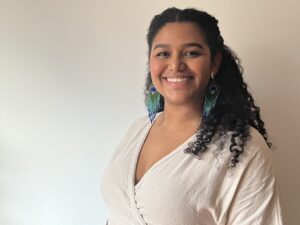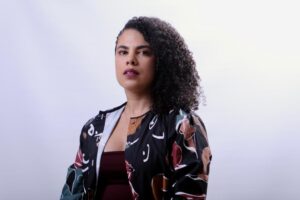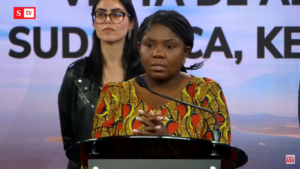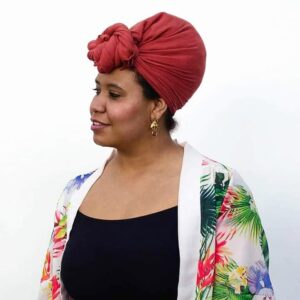For the first time in the history of the Gabo Awards, a Colombian journalistic work won in the text category. The award went to Afro-Colombian journalist Beatriz Valdés Correa. She won it in a Colombia that continues to be one of the most dangerous countries in the continent for journalists. And she won it with a feature story published in El Espectador, which highlights the situation of Afro-Colombian women victims of sexual violence in the context of the armed conflict. Despite the fact that Colombia's vice-president is an Afro-Colombian woman — Francia Márquez —, racism is still firmly rooted in this society’s foundations, according to experts. Faced with this situation, how do the mass media cover the facts of the Afro-descendant population in Colombia?

Beatriz Valdés Correa, an Afro-Colombian journalist. Winner of the 2023 Gabo Award in the text category. (Photo: Deivy Rubriche Torres)
"The mass media in Colombia only, almost exclusively, cover the Afro-Colombian population when it is a complex issue, not to mention disaster and violence", Beatriz Valdés told Latam Journalism Review (LJR) in an interview. The journalist believes this population is underrepresented in the media agenda, and offered some examples of when they do pay attention to it.
This happens "when there is an event of great impact such as a major accident or when violent events occur in these populations," she said. Another aspect the journalist analyzed is that when Afro populations demonstrate, which also happens with the Indigenous population, the media coverage focuses on "the impact that may arise from that demonstration." For example: "if the demonstrators close a road, they cover the economic losses or the people who did not manage to get to the places they were supposed to travel to, but they do not cover so strongly, nor do they look at why the demonstration is taking place and what are their claims," she said.
The fact that the media do not cover the claims made by the populations in their territories or that they normalize the violence of the armed conflict that frequently puts populations in confinement in departments such as Chocó or Cauca, demonstrates the racial bias they have. "There is a racist bias with the way in which Afro-descendant peoples are looked at. They carry on with the idea that there’s only poverty and violence there. It’s [considered] less important because it’s what happens to Black people," Valdés said.

Sofía León Oñate, Colombian political scientist and Afrofeminist. (Photo: Courtesy of Sofía León Oñate)
Colombian political scientist and Afro-feminist Sofía León Oñate, told LJR that in Colombia "Black presence is not only something to do with the armed conflict or rural topics." Or as Valdés said: "It’s a false notion that Black populations do not produce knowledge. The media and journalists do not listen to these communities as expert or qualified voices to talk about certain issues."
León Oñate goes on to explain: "The media have reinforced the idea that Black communities exist as communities in rural areas and that it was strange for them to build cities. This is racist because Cartagena de Indias is a city built by Blacks since colonial times."
Francia Márquez is a novelty in Colombian politics. She is a native of Valle del Cauca, an area of the Colombian Pacific coast that continues to suffer the consequences of an armed conflict that has been raging in the country for more than 60 years. She is also Afro-descendant and from a poor background, a social leader and defender of the environment and human rights who graduated as a lawyer, and in August 2022 became the country's vice president, along with President Gustavo Petro.
"There have been racist criticisms of what Francia Márquez does or does not do, and it’s very clear to the extent that these are criticisms that are not made, or had not been made, to other officials," Valdés said. Márquez's political career has not been conventional, and in this scenario her opponents and the mass media have questioned everything: What she says, how she says it, where she goes and how she gets there.

Francia Márquez, Vice President of Colombia, at a press conference at the Casa de Nariño explaining the operational and economic details of the trip she made to the African continent in May 2023. (YouTube screenshot)
"Forgive me, Colombians, for putting it this way, but de malas [in a bad way]. I am vice president of this country and as long as I am, the State has a responsibility to provide me with all the security guarantees necessary for me to fulfill my task as vice president." This is a fragment of Márquez's answer when asked by the director of Semana magazine, Vicky Dávila, in an interview about the controversy sparked by her use of a State helicopter to travel to her home.
It is not the first time that Márquez has been questioned about this issue. Since she took office, she has had to give all kinds of explanations about the house in which she lives or the helicopter in which she travels. Another example is a video that went viral. Márquez had just been elected vice-president and CM& newscaster Claudia Palacios asked her if living in the vice-presidential house would be "vivir sabroso [to live joyfully]." This is a philosophy of life that is rooted in the ancestral beliefs of the Afro-descendant peoples of the Colombian Pacific, which puts life at the center, and which Márquez turned into her campaign slogan. The vice-president accused the presenter of asking her a classist question.
She again explained that all presidents and vice presidents in the country have used State aircraft to guard their security. In addition, that earlier this year a failed attempt was made on her life, when her security team found more than seven kilos of explosives on the road leading to her residence. "Why can't a poor and humble vice-president, who comes from below, use them?," she asked during the interview with Semana.
"Francia Márquez's coverage has been very racist. The only focus is on the expenses she incurs," León Oñate said. She refers to the fact that the mass media have been busy covering how much the vice-president's security scheme costs the Colombian state, or the trip she made to the African continent in May 2023. In these coverages only "an isolated piece of information has been given, but there is no comparison, for example, to how much the security of other presidential figures costs. When you give decontextualized data it is biased coverage."
Once the interview with Semana magazine aired, the vice president was again criticized for her "arrogant response," and for using the expression "de malas [in a bad manner]." "In interviews, we noticed an exhausted Francia Márquez, and it’s a way of telling people that this is not right and that she will not tolerate it. She came to work and not to be accountable to every man who wants to judge her role," Carolina Rodríguez Mayo told LJR.
In this sense, León Oñate adds that the fact that the media is scrutinizing the tone of the vice-president only reinforces "the stereotype of the brave Black woman who is always angry or who should respond in a docile manner to certain questions." She is also "criticized for how she dresses and what her clothing conveys. In personal terms, her story is told without contextualizing what she represents," she said. She gave as an example this editorial opinion of El Espectador in which reference is made to the vice-president's "terrible habit of responding aggressively."
Márquez's trip to the African continent with a delegation in May 2023 received a great deal of media attention. In eight days Marquez visited South Africa, Kenya and Ethiopia in order to strengthen Colombia's diplomatic, economic, political and cultural relations with those countries. The interviewees agreed that this media coverage was very biased, and that it focused mainly on the cost of the trip and not on its relevance or the benefits it might bring to Colombia's international relations.

Carolina Rodríguez Mayo, Colombian writer and anti-racist educator (Photo: Courtesy of Carolina Rodríguez Mayo)
For example, this WRadio article focuses on the expenses involved in this trip and calls it a "waste." Another example is an article in Semana magazine that questions — and even mocks — the "living joyfully," and her decision to have the Swahili language taught in Colombia. Some Colombian media and social network users have associated living sabroso with "laziness, wasting resources, and being haughty and rude," Rodríguez Mayo said. "There we see tremendous racism. It’s a denial of all the philosophical work behind Afrocentric thinking that is related to the Ubuntu" of Africa. At the time of this article’s closing, Semana magazine had not responded to requests for clarification over its articles and statements on Francia Márquez.
Faced with this situation, "it is easy to read that there is no journalistic exercise, there are statements based on hypotheses. I do not believe that any person trained in journalism can say that this is not done in bad faith,” Rodríguez Mayo said. “The mass media have an ethical and enormous job, which is to inform a country. It has to be put on the table that they do so in a critical manner, pondering the facts and not simply the questions."
"Journalists and the media should be much more familiar with and trained in the coverage of ethnic populations," Valdés said. "I doubt that day-to-day journalists in Colombia understand what the territory means for the Black population, understand what the key points of Law 70 are, and why Afro-descendant populations hold community councils and large tracts of land. That is key to understanding it. Many times the racist bias comes from a structural issue, but many times it’s ignorance."
For the Gabo Award winner, there should also be an effort by the media to create more diverse newsrooms, in which journalists are trained to address the claims and culture of the Afro-Colombian population, leaving stereotypes and racism behind. "There’s coverage based on showing Afro-Colombian populations as happy people who cook delicious food, when there is so much more to it," she adds.
Regarding the media coverage of the vice-president, Rodríguez Mayo believes it’s necessary for "alternative media to confront the public and the mass media about the disinformation campaign they’ve engaged in since the candidacy of Francia Márquez." The other thing she criticized is the "lack of anti-racist education in the media in general, and the need to stand up from other angles in order to do a better job."